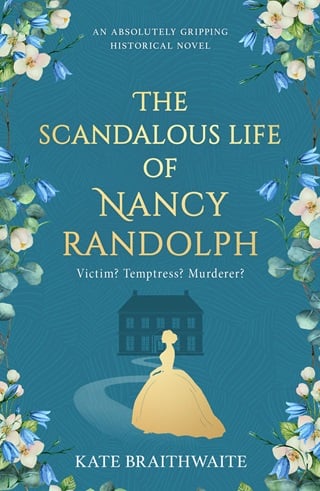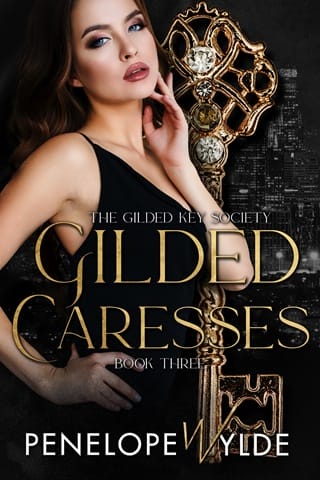Chapter Thirty-Seven
In truth, she had resolved on it as soon as she'd read her sister's last letter. It was what she must do. Nancy insisted Phebe accompany her and Mr. Morris to Tuckahoe. They would continue across Virginia and go to Bizarre.
Mr. Morris, apprised of this new plan following Judy's interment, cast his wife a quizzical glance but complied with typical grace and good humor. They said their farewells to the family at Tuckahoe and drove off in silence. The weather was fine, and Phebe sat up with the driver. Mr. Morris claimed tiredness and closed his eyes, leaving Nancy to stare out at the familiar Virginia landscape, trying to reconcile her memories of her life there with the person she'd become.
The hours passed. As they drove through the familiar close line of trees that led to the house, Nancy visualized Bizarre as it had been, a mistake it turned out, as the contrast with the reality of what she found there took her breath away.
The house was gone. Where walls had stood, now there was nothing but air and a view of the other plantation buildings — kitchen, smokehouse and stables — all dilapidated and disused. The foundations of Bizarre remained, a blackened mess of charred wood and rubble, although nature was at work, and green shoots gathered where the parlor had once stood. She and Mr. Morris circled the ruin. She pointed out where the porch had been, the back door, her bedroom window, and he nodded, letting her take her time and absorb the changes. The kitchen garden brought her close to tears. The fence had fallen in, battered by weather or weighted down by the rampant weeds and tall grasses overrunning the old pathways between her lovingly tended vegetable beds.
Mr. Morris came and stood beside her. "Dearest. Why are we here?"
"I need to see one more thing. I'd like you to be there when I do. Only Phebe knows where." She saw him frown a little and touched her hand to his face. "It won't take long."
She beckoned to Phebe, who had wandered toward the old slave quarters, also now abandoned. "Can you show us now?"
Phebe nodded. "It's this way."
Nancy stretched out her hand to Mr. Morris, and they followed Phebe away from the ruined house and toward a line of trees to the south.
"This was a tobacco field," Nancy said, pointing to her left. "I'm surprised John Randolph of Roanoke has not maintained the land. Or am I?" She rolled her eyes and enjoyed her husband's smile.
"I thought we agreed never to speak of that infernal creature."
"We did. But it's hard not to think of him when I'm here. And not all my memories of Bizarre are unhappy."
"Where is Phebe taking us?"
"To my first child's grave. I've never seen it."
He stopped and stared. "I thought the child died at Glentivar."
She shook her head. "No. It happened here. Come. Let me pay my respects, and then I will explain."
They did not have far to walk. At a break in the trees, Phebe turned into a wooded area and stopped before a large white pine. She bent to examine its bark and with one finger, traced the outline of a cross.
"She's here."
She. "The baby" was how Nancy thought of her, never as she or her, afraid to open the door to thoughts of the little girl she never became. Her first child. Her lost daughter. Having Gouverneur sharpened her grief.
"Thank you." Nancy bowed her head. She had lost a child. Blamed herself. Known a late hope for her survival. Now this. A sense of ending. She took a minute to let some of the sadness unfurl and then turned to her husband.
"There are things I must tell you."
He nodded.
"She was born here in 1792, on September thirtieth. We were due to travel to Glentivar the next day. Judy knew nothing of it." Nancy sighed deeply. "She was only alive for a few minutes. I believed . . . for the longest time, I thought I'd killed her. I'd wished her away so often, you see, that terrible summer. Taken gum guaiacum so carelessly. But Phebe learned it was an accident. Dick's slave, Syphax, brought her body here. I had never asked what happened. I was so certain it was my fault. It's only thanks to Phebe that we stand here now."
"But at Glentivar?"
"Judy insisted we all went. We'd sworn she would not find out. I had been carrying on for months that I was sick. I thought if I didn't go to Glentivar, she might suspect me. I thought if I could just tolerate the journey, then I'd claim an attack of the colic and retire to my bed. That's what I did. But then I bled. The afterbirth, Phebe said, it had not all come away. She was only young. We were both little more than children." Nancy put her hands to her face. "I nearly died at Glentivar. Phebe saved me. She found herbs to stop the bleeding. Begged one of Randy's slave women for new sheets. Dick took the bloody ones out and left them for the woman to clean them or burn them. He left them on a shingle pile — evidence enough to almost ruin us both. My God, we tried so hard to hide it all. And yet it followed me. It haunts me."
"It's over, Nancy. No one of real importance has listened to Jack. He hasn't come between us. We have our own son now—"
"But I haven't told you everything. I've never been entirely honest." She stared at the hollow in the tree, trying to find the courage to continue. Judy would have prayed for strength. Nancy could not.
"I think I already know," he said softly. "Do you remember the book? The Power of Sympathy?"
She turned her eyes up to him. "You know?"
"I told you about my Boston poet, Sarah Morton, did I not? It was her sister and husband's story you read in the novel. Sarah's husband seduced her sister. It was years later, when she and I were lovers, but Sarah talked of her sister often. She didn't blame her. Her suicide was the greatest sorrow of Sarah's life. I wanted you to know that nothing you could tell me would shock me. I have never sought to judge you."
"Judy would have judged me most harshly."
"She may not have."
Somehow, Nancy found a smile. "Oh, I think we can be fairly certain. It was a terrible betrayal."
"Did you love him?"
"Dick? Yes. Very much."
"And Theo?"
"Never. I suppose there were moments I thought I might have married him. We were thrown together. Children playing as adults. Far away from anxious eyes." She frowned. "No. It sounds like I'm making excuses. There are none. What I did to my sister was unforgivable. I spent years trying to make it up to her." Her voice cracked on a sudden wave of grief. "Do you — do you think she knew it?"
"No." His voice was solid, dependable, full of certainty.
"We promised each other she would never know, Dick and I. There was only unkindness in the truth. Only more pain and sorrow. I wanted to admit it was Theo from the first. I wrote a letter confessing to carrying Theo's child, but Dick tore it up. He said it was better to deny it all. He said Judy and the boys must never know the truth. I even lied to you about it. I'm sorry for that."
"You've told me now," he said, pulling her to his chest. "For what it is worth, I think telling Judy the truth would have done no good and much harm. The truth is overrated, Nancy dear, if it hurts and cannot heal."
"She did suspect us. There was a ring he gave me. I wore it on a chain. I'm sure she saw it. She must have wondered."
"I've not seen this. Do you have it still?"
"I removed it before I married you."
"Good."
They spent a final quiet moment at the grave. She knelt and put her palm to the earth, feeling its warmth and thinking of Gouverneur.
"Do you honestly believe the truth is overrated, husband?" she asked as he helped her back into the carriage. "Doesn't the Bible teach that the truth will set you free?"
"It does." His hand covered hers on his arm, and she welcomed the warm confidence that had drawn her to him in the first place. "But when it comes to the past histories of men and women, adults, who have found happiness together later — as we have done — I believe that the only truth we need is how we feel about each other today and tomorrow. Come, my love. Let us go home to our son."
 Fullepub
Fullepub 



